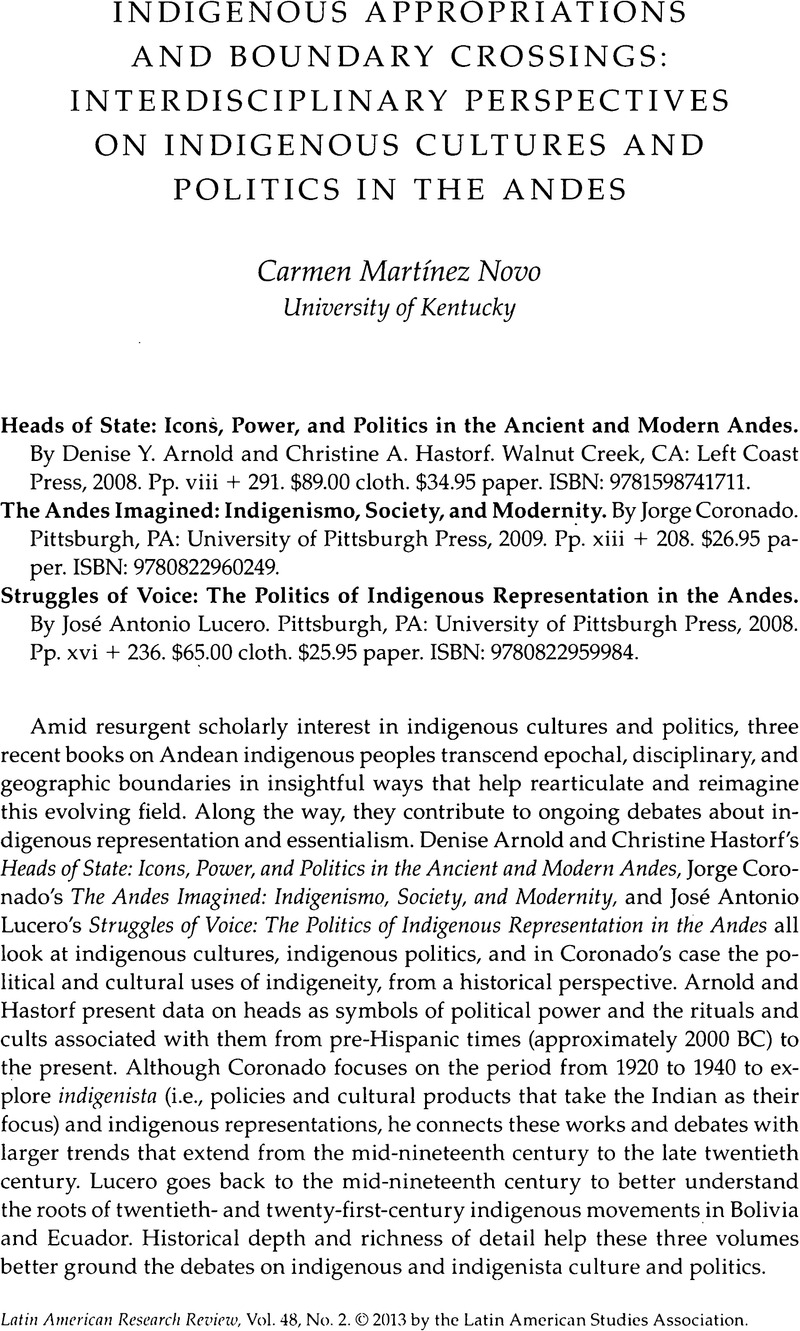No CrossRef data available.
Article contents
Indigenous Appropriations and Boundary Crossings: Interdisciplinary Perspectives on Indigenous Cultures and Politics in the Andes
Review products
Published online by Cambridge University Press: 05 September 2022
Abstract

- Type
- Review Essays
- Information
- Copyright
- Copyright © 2013 by the Latin American Studies Association
References
1. See John Victor Murra, The Economic Organization of the Inca State (Greenwich, CT: Jai Press, 1980); Frank Salomon, Native Lords of Quito in the Age of the Incas: The Political Economy of North Andean Chiefdoms (1986; Cambridge: Cambridge University Press, 2007).
2. Personal communication with Luis Alberto Tuaza (with whom I have long collaborated), October 10, 2012.
3. Eduardo Viveiros de Castro, From the Enemy's Point of View: Humanity and Divinity in an Amazonian Society (Chicago: University of Chicago Press, 1992).
4. Denise Arnold, with Juan de Dios Yapita, The Metamorphosis of Heads: Textual Struggles, Education, and Land in the Andes (Pittsburgh, PA: University of Pittsburgh Press, 2006).
5. See Marisol de la Cadena, Indigenous Mestizos: The Politics of Race and Culture in Cuzco, Peru, 1919–1991 (Durham, NC: Duke University Press, 2000); Deborah Poole, Vision, Race, and Modernity: A Visual Economy of the Andean Image World (Princeton, NJ: Princeton University Press, 1997).
6. See Andrés Guerrero, “Una imagen ventrílocua: El discurso liberal de la desgraciada raza indígena a fines del siglo XIX,” in Imágenes e imagineros: Representaciones de los indígenas ecuatorianos siglos XIX y XX, edited by Blanca Muratorio (Quito: FLACSO Ecuador, 1994), 197–252.
7. See Andrés Guerrero, “La desintegración de la administración étnica en el Ecuador,” in Sismo étnico en el Ecuador, edited by José Almeida (Quito: Centro para el Desarrollo y la Investigación sobre Movimientos Sociales del Ecuador, 1993), 91–112; and Marc Becker, Indians and Leftists in the Making of Ecuador's Modern Indigenous Movements (Durham, NC: Duke University Press, 2008).
8. See León Zamosc, “The Indian Movement and Political Democracy in Ecuador,” Latin American Politics and Society 49, no. 3 (2007): 1–34; Carmen Martínez, “The Backlash against Indigneous Rights in Ecuador's Citizen's Revolution,” in Latin America's Multicultural Movements: The Struggle between Communitarianism, Autonomy and Human Rights, edited by Todd Eisenstadt, Michael Danielson, Moisés Bailón, and Carlos Sorroza (Oxford: Oxford University Press, 2013), 111–134.
9. Nancy Postero, “After the Revolution: Shifting Notions of Indigeneity in Evo Morales's Bolivia” (paper presented at the conference “Repositioning Indigeneity in Latin America,” Johns Hopkins University, November 4–6, 2010).
10. See Carlos de la Torre, Populist Seduction in Latin America (Athens: Ohio University Press).
11. See Alison Brysk, From Tribal Village to Global Village: Indian Rights and International Relations in Latin America (Stanford, CA: Stanford University Press, 2000); Joanne Rappaport, Intercultural Utopias: Public Intellectuals, Cultural Experimentation, and Ethnic Pluralism in Colombia (Durham, NC: Duke University Press, 2005).


